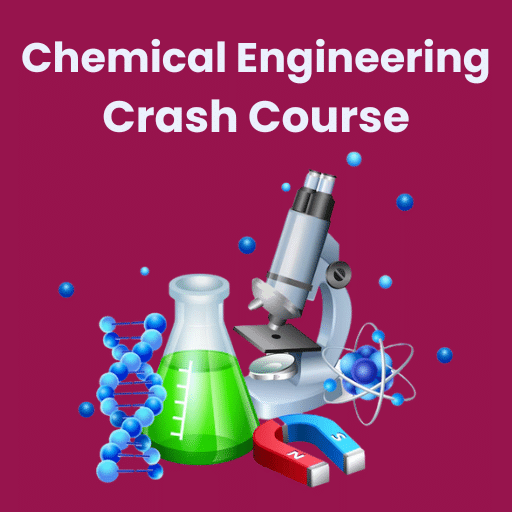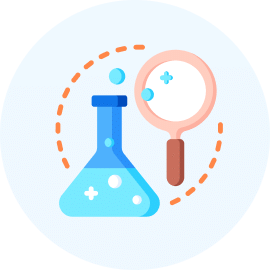
|
PARTNER COURSE
Crash Course for GATE Chemical Engineering179 students learning this week · Last updated on Oct 12, 2025 |
Crash Course for GATE Chemical Engineering Study Material
Trending Courses for GATE Chemical Engineering
Crash Course for GATE Chemical Engineering Exam Pattern 2025-2026
Crash Course for GATE Chemical Engineering
Exam Pattern for GATE Chemical Engineering
The Graduate Aptitude Test in Engineering (GATE) is a crucial examination for aspiring engineers, particularly for those in the field of Chemical Engineering. Understanding the exam pattern is essential for effective preparation. Below are the key components of the GATE Chemical Engineering exam pattern:
1. Exam Format
- Mode: The GATE exam is conducted in a Computer-Based Test (CBT) format.
- Type of Questions: The exam consists of multiple-choice questions (MCQs), multiple select questions (MSQs), and numerical answer type questions (NATs).
2. Total Marks
- The GATE Chemical Engineering paper is typically of 100 marks.
3. Duration of Exam
- The total duration of the GATE exam is 3 hours.
4. Sections of the Paper
- General Aptitude: This section includes 15 marks and tests the candidate's verbal and numerical ability.
- Core Engineering Subjects: The remaining 85 marks cover core topics in Chemical Engineering.
5. Marking Scheme
- MCQs: For correct answers, candidates receive +1 or +2 marks depending on the question's difficulty; incorrect answers lead to a negative marking of -1/3 or -2/3 marks.
- MSQs: No negative marking applies for these questions.
- NATs: These questions also do not have negative marking.
6. Subjects Covered
- The syllabus for Chemical Engineering includes topics such as Thermodynamics, Fluid Mechanics, Chemical Reaction Engineering, Process Calculations, and more.
7. Important Tips
- Practice Regularly: Consistent practice of previous years' papers can help in understanding the pattern and difficulty level.
- Time Management: Develop a strategy to manage time effectively during the exam.
- Focus on Concepts: A strong grasp of fundamental concepts is crucial for solving complex problems.
By understanding the exam pattern, candidates can strategize their study plan effectively, ensuring a well-rounded preparation for the GATE Chemical Engineering examination.
Crash Course for GATE Chemical Engineering Syllabus 2025-2026 PDF Download
GATE Chemical Engineering Syllabus
The Graduate Aptitude Test in Engineering (GATE) for Chemical Engineering is a crucial examination for aspiring chemical engineers looking to pursue higher studies or secure jobs in prestigious organizations. Below is a detailed syllabus that encompasses various core subjects and topics essential for GATE Chemical Engineering preparation.
GATE Chemical Engineering Crash Course
To excel in GATE Chemical Engineering, a crash course can provide a structured approach to cover the syllabus efficiently. The crash course should focus on:
- Understanding key concepts
- Solving previous years' question papers
- Time management strategies
- Mock tests and practice sessions
GATE Chemical Engineering Engineering Mathematics
This section covers essential mathematical tools that are fundamental to solving engineering problems. Key topics include:
- Linear Algebra
- Calculus
- Probability and Statistics
- Numerical Methods
- Differential Equations
GATE Chemical Engineering Process Calculations and Thermodynamics
Understanding the principles of process calculations and thermodynamics is vital for chemical engineering. Important areas include:
- Material and Energy Balances
- Thermodynamic Laws
- Property Relations
- Phase Equilibria
- Chemical Reaction Equilibria
GATE Chemical Engineering Fluid Mechanics and Mechanical Operations
Fluid mechanics is crucial for understanding fluid behavior in chemical processes. Key topics include:
- Fluid Statics and Dynamics
- Bernoulli’s Equation
- Viscous Flow
- Pumps and Compressors
- Mechanical Operations (Size Reduction, Screening, etc.)
GATE Chemical Engineering Heat Transfer
This section focuses on the principles and applications of heat transfer. Important topics include:
- Conduction, Convection, and Radiation
- Heat Exchangers
- Thermal Conductivity
- Heat Transfer in Chemical Processes
GATE Chemical Engineering Mass Transfer
Mass transfer processes are essential in chemical engineering. Key topics include:
- Diffusion and Mass Transfer Coefficients
- Absorption and Distillation
- Extraction and Leaching
- Membrane Separation Processes
GATE Chemical Engineering Chemical Reaction Engineering
This area covers the principles of chemical reactions and reactor design. Important topics include:
- Kinetics of Chemical Reactions
- Batch and Continuous Reactors
- Reaction Mechanisms
- Catalysis
GATE Chemical Engineering Instrumentation and Process Control
Instrumentation and control are critical for process optimization. Key areas include:
- Measurement Techniques
- Control Theory
- Process Dynamics
- Control Systems Design
GATE Chemical Engineering Plant Design and Economics
This section involves understanding the design and economic aspects of chemical plants. Important topics include:
- Plant Layout and Design
- Cost Estimation
- Economic Analysis
- Project Management
GATE Chemical Engineering Chemical Technology
This covers various chemical processes and technologies used in the industry. Key topics include:
- Petrochemical Processes
- Biochemical Engineering
- Polymer Technology
- Environmental Technology
Conclusion
A comprehensive understanding of the above topics is essential for success in the GATE Chemical Engineering examination. A structured study plan, practice, and mock tests will significantly enhance your preparation. Focus on these key areas, and you will be well on your way to achieving your goals in GATE Chemical Engineering.
This course is helpful for the following exams: GATE Chemical Engineering
How to Prepare Crash Course for GATE Chemical Engineering?
How to Prepare Crash Course for GATE Chemical Engineering
Preparing for the GATE (Graduate Aptitude Test in Engineering) can be a daunting task, especially in the field of Chemical Engineering. The GATE Chemical Engineering Crash Course offered by EduRev is designed to help you streamline your preparation effectively. Here are some essential tips to optimize your preparation:
1. Understand the GATE Chemical Engineering Syllabus
To begin your journey with the GATE Chemical Engineering Crash Course, familiarize yourself with the syllabus. The course covers key topics such as:
- Chemical Reaction Engineering
- Thermodynamics
- Fluid Mechanics
- Mass Transfer
- Process Calculations
Understanding these topics will help you prioritize your study material.
2. Create a Study Schedule
A well-structured study schedule is vital when preparing for the GATE Chemical Engineering exam. Allocate specific time slots to cover different subjects included in the crash course. Ensure that you:
- Set realistic goals
- Include regular revision sessions
- Allocate time for practice tests
3. Utilize Comprehensive Study Material
The GATE Chemical Engineering Crash Course from EduRev provides extensive study material, including:
- Video Lectures
- Study Notes
- Previous Year Question Papers
- Mock Tests
Make sure to utilize these resources effectively to reinforce your understanding.
4. Focus on Conceptual Clarity
While preparing for the GATE Chemical Engineering exam, it’s crucial to build a strong conceptual foundation. The crash course emphasizes:
- Understanding fundamental concepts
- Application of concepts in problem-solving
- Clarifying doubts through discussions and forums
5. Practice Regularly
Regular practice is essential for success in the GATE Chemical Engineering exam. Engage in:
- Daily problem-solving
- Weekly mock tests
- Peer discussions on complex topics
The GATE Chemical Engineering Crash Course from EduRev provides plenty of practice questions to enhance your skills.
6. Revise and Evaluate
Revision is key to retention. Regularly revisiting the topics covered in the GATE Chemical Engineering Crash Course will help reinforce your memory. Additionally, evaluate your progress through:
- Self-assessment tests
- Identifying weak areas
- Focusing on improvement strategies
7. Stay Motivated and Healthy
Lastly, maintain a positive mindset throughout your preparation journey. It’s important to:
- Take regular breaks
- Engage in physical activities
- Stay connected with fellow aspirants
This balance will help you stay motivated and focused during your GATE Chemical Engineering preparation.
In conclusion, the GATE Chemical Engineering Crash Course offered by EduRev is a structured approach that, when followed diligently, can significantly boost your preparation efforts. By understanding the syllabus, creating a schedule, utilizing comprehensive materials, focusing on concepts, practicing, revising, and staying motivated, you can enhance your chances of success in the GATE exam. Good luck!
This content is designed to be visually appealing and informative, with headers and key points clearly highlighted.
Importance of Crash Course for GATE Chemical Engineering
Importance of Crash Course for GATE Chemical Engineering
Preparing for the GATE (Graduate Aptitude Test in Engineering) exam can be daunting, especially for Chemical Engineering aspirants. A crash course specifically designed for GATE Chemical Engineering can make a significant difference in your preparation journey. Here’s why investing in a crash course is essential:
1. Comprehensive Coverage of Syllabus
A crash course ensures that you cover the entire syllabus systematically. This is crucial for GATE as it encompasses various topics in Chemical Engineering, including:
- Thermodynamics
- Fluid Mechanics
- Chemical Reaction Engineering
- Process Calculations
- Mass Transfer
- Heat Transfer
2. Time-Efficient Learning
With the vast syllabus and limited preparation time, a crash course offers a structured and focused approach. It optimizes your study hours by:
- Condensing complex topics
- Highlighting key concepts
- Providing essential problem-solving techniques
3. Expert Guidance
Crash courses are typically led by experienced faculty who have in-depth knowledge of the GATE exam pattern and syllabus. Their insights can help you:
- Understand exam strategies
- Avoid common pitfalls
- Enhance conceptual clarity
4. Practice and Revision
The importance of practice cannot be overstated in GATE preparation. A crash course often includes:
- Mock tests
- Previous year question papers
- Regular quizzes
This helps in reinforcing what you've learned and identifying areas that need further attention.
5. Boosts Confidence
Completing a crash course equips you with the knowledge and skills necessary for tackling the GATE exam confidently. This boost in confidence can lead to:
- Better performance
- Improved time management during the exam
- Reduced anxiety
6. Networking Opportunities
Joining a crash course allows you to connect with fellow aspirants. This can lead to:
- Study groups
- Peer support
- Sharing of resources and strategies
Conclusion
In conclusion, a crash course for GATE Chemical Engineering is not just an added advantage; it is a vital component of effective preparation. By ensuring comprehensive coverage, expert guidance, and ample practice opportunities, a crash course can significantly enhance your chances of success in the GATE exam.
Crash Course for GATE Chemical Engineering FAQs
| 1. What is GATE and why is it important for Chemical Engineering students? |  |
| 2. What are the eligibility criteria for the GATE Chemical Engineering exam? |  |
| 3. What subjects are covered in the GATE Chemical Engineering syllabus? |  |
| 4. How can I prepare effectively for the GATE Chemical Engineering exam? |  |
| 5. What is the exam pattern for GATE Chemical Engineering? |  |
| 6. How is the GATE score calculated? |  |
| 7. What is the significance of the GATE score in job placements? |  |
| 8. Are there any specific books recommended for GATE Chemical Engineering preparation? |  |
| 9. How can I manage my time effectively during the GATE exam? |  |
| 10. What are some common mistakes to avoid while preparing for GATE? |  |
| 11. Can I apply for GATE without a B.Tech degree? |  |
| 12. How often is the GATE exam conducted? |  |
| 13. Is there a negative marking in the GATE Chemical Engineering exam? |  |
| 14. What is the registration process for GATE? |  |
| 15. How can I find previous years' GATE Chemical Engineering question papers? |  |
Best Coaching for Crash Course for GATE Chemical Engineering
Tags related with Crash Course for GATE Chemical Engineering

|
View your Course Analysis |

|

|
Create your own Test |

|































